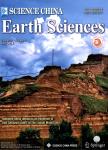Experimental remolding on the caprock's 3D strain field of the Indosinian-Yanshanian epoch in Tongling deposit concentrating area
Experimental remolding on the caprock’s 3D strain field of the Indosinian-Yanshanian epoch in Tongling deposit concentrating area作者机构:State Key Laboratory of Geological Processes and Mineral Resources China University of Geosciences Beijing 100083 China Faculty of Earth Sciences China University of Geosciences Wuhan 430074 China Department of Earth Sciences Jilin University Changchun 130061 China
出 版 物:《Science China Earth Sciences》 (中国科学(地球科学英文版))
年 卷 期:2005年第48卷第7期
页 面:863-874页
核心收录:
学科分类:0709[理学-地质学] 081803[工学-地质工程] 07[理学] 08[工学] 0818[工学-地质资源与地质工程]
基 金:the National NaturalScience Foundation of China(Grant No.40234051) the Special Plansof Science and Technology of Land Resource Department(Grant No.20010103) the National Important Layout ltems of Basic ResearchDevelopment(Grant No.1999043206) the Fostering Plan Fund forBeyond-Century Excellent Talent the Key Project of Science and Technology Research(O3178)of the Ministry of Education
主 题:Tongling deposit concentrating area Indosinian-Yanshanian epoch 3D structural frame of the caprock analogue experiment slicing and stripping analysis structural model.
摘 要:Based on field observations and rheology analysis, we perform one analogue experiment and remold the 3D structural frame of Tongling deposit concentrating area firstly. Then we disassemble and dialyze the 3D structures of the model using the methods of slicing and stripping. A series of sliced planes vertical to the fold hinges show similar landscapes of that in the drill hole profiles. Meanwhile, layer stripping analysis indicates that the deformation features of each layer in the model are qualitatively analogical to those obtained from field observations. Through contrasting the 3D structure between the experimental model and the field phenomena, we verify the following 3D deformation features of the caprock in this area: (1) the Tongling area mainly consists of three series of NE S-typed fold groups; (2) in the uniform stress field, the incoherent folds universally develop in different positions, along different axes as well as in different strata; (3) the faults propagate upward which are mostly inter-bedded detachment faults, while the fold amplitudes decrease while going deeper; and (4) the folds and cleavages are highly developed in the Silurian System indicating that the deformation effect of the Indosin-ian-Yanshanian structural layer terminates at this layer, which suggests that the Silurian System is the crucial layer for the inversion between brittle and plastic deformation domains and the underlying strata are subject to the control of another deformation system with distinct properties.



